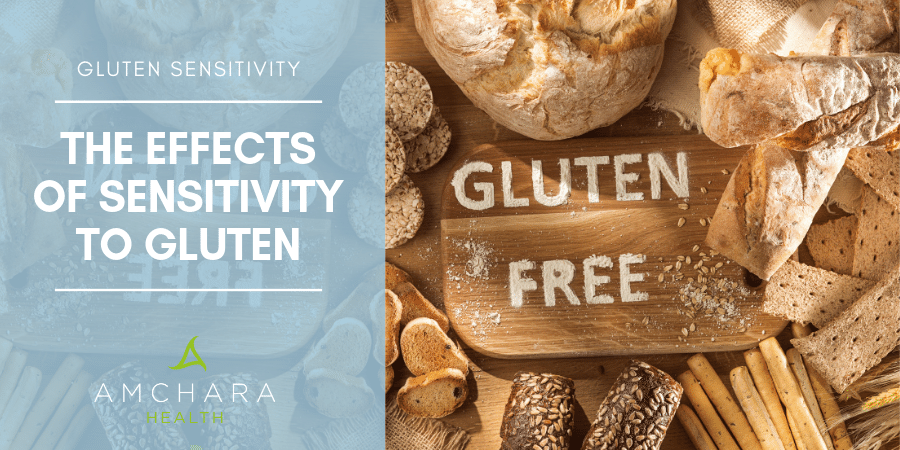Topics Covered in this article:
Gluten receives a lot of attention and the gluten-free food industry is booming as increasing numbers of people are choosing to avoid it.
Over recent years there has been a lot of research on the potential health impact of gluten – additionally, you may be surprised to learn that there are more hidden effects gluten may be having on your health.
We always take an evidence-based approach and in this article we take a closer look at gluten and how it can affect both body and mind.
What is gluten?
Gluten is a term used to describe a group of storage proteins found in certain grains.
There are many types of proteins in grains including prolamins and glutelins.
Common proteins in these groups are gliadin and glutenin, as found in wheat.
Other grains that contain gluten include rye, barley, einkorn, emmer, spelt, bulgar wheat and Khorasan (also called kamut) wheat.
These protein fractions in grains have been shown to have wide ranging effects on the body.
One of the most commonly recognised issues with gluten is coeliac disease, an auto-immune condition where eating gluten provokes an over-reaction of the immune system and production of antibodies that mistakenly attack and damage the gut lining.
Symptoms can be severe and debilitating and lifelong avoidance of gluten is required.
Evidence is now showing that a condition called non-coeliac gluten sensitivity (NCGS) is actually six times more common than coeliac disease (1).
This condition is provoked by gluten but does not involve the same immune response as in coeliac disease.
Gluten sensitivity seems to be on the rise, perhaps due to a range of factors including increased awareness of the impact of gluten, over-processing of wheat, increased consumption of gluten containing foods, eating a narrow range of foods and a higher gluten content in newer varieties of grains.
Why doesn’t it affect everyone?
Although NCGS is becoming more common, gluten doesn’t seem to affect everyone.
It is also common for people who have tolerated grains containing gluten for years to then develop issues with it later on.
As with many health conditions, there can be several factors involved and it may take an accumulation of these factors to provoke a response.
Genetics
The genes we inherit carry information that can influence enzyme activity and give rise to an increased sensitivity to certain food substances.
It is well known that coeliacs carry certain gene variations and these variations can also be seen in 50-90% of those with NCGS (2,3,4,5).
Toxic load
The modern world is full of toxins which are not only ingested via the food we eat but can also be inhaled or absorbed through skin.
Accumulation of toxins and inability to deal with the toxic load can put pressure on many systems and it is thought that this can lead to Toxicant-Induced Loss of Tolerance (TILT), where the body begins to react to compounds that wouldn’t normally be an issue.
This is proposed to be the mechanism behind multiple chemical sensitivity but may also apply to the increasing incidence of food intolerances (6).
Microbiome balance
The collection of beneficial micro-organisms in the gut, called the microbiome are known to play a large role in immunity.
This isn’t surprising as 70% of the immune system resides in the gut.
They are responsible for keeping the gut lining healthy – as the gut is one of the first lines of defence, keeping it healthy is important to prevent over-reaction of the immune system.
An imbalance in gut bacteria, also known as dysbiosis, may impact the health of the gut lining (7), further lowering tolerance to gluten.
Dysbiosis can be affected by many things including poor nutrition, stress, lack of sleep, toxins, physical inactivity, smoking and alcohol.
How does gluten impact physical health?
Signs and symptoms of NCGS can mimic those seen in coeliac disease and include:
- Abdominal cramps
- Diarrhoea
- Constipation
- Bloating
- Nausea
- Headaches
- Fatigue
- Achy joints
- Skin issues
Gut
One of the hallmark features of coeliac disease is the damage to the gut lining and flattening of the villi. These are the finger like projections within the gut lining that support nutrient uptake.
This significantly affects nutrient balance and the defence mechanism provided by the gut lining.
In NCGS there does not seem to be alterations to the gut lining.
It is often thought that gluten leads to increased intestinal permeability, also called leaky gut, but evidence into NCGS suggests it is not always involved (
However, there are many conditions associated with NCGS that are also linked with leaky gut.
Whether leaky gut predisposes a person to react to gluten or whether gluten is actually contributing to poor gut health is still to be determined.
Microbiome
What is known however, is that NCGS can impact the delicate microbiome.
The gut houses trillions of micro-organisms that have a direct role in the immune system and the inflammatory response. They also have a direct link to the brain so can alter psychological functioning.
Dysbiosis seen in NCGS seems to trigger gut inflammation, increase sensitivity in gut tissues (visceral hypersensitivity) and to alter communication from the gut to the nervous system and the brain (9).
Immune system
The immune system is normally primed ready to defend the body against invaders (chemical, biological, or from food); it seems that in NCGS, gluten proteins provoke the immune system to release anti-gliadin anti-bodies (10).
These are different from the type of anti-bodies released in coeliac disease.
Gliadin also activates the inflammatory pathways and there is an increase in pro-inflammatory messengers called cytokines (11).
Inflammation can affect all parts of the body and chronic low grade inflammation is seen in many conditions. The increase in inflammatory compounds may explain why achy joints and muscles are seen in some cases of gluten sensitivity.
Non-gluten proteins found in wheat may also pose a problem and studies have shown that ATIs (amylase trypsin inhibitors) can trigger an inflammatory response that may be related to intestinal inflammation (12).
There is a strong link between gluten sensitivity and functional gut disorders such as IBS.
How does gluten impact mental health?
Many people think that gluten sensitivity presents mainly gut symptoms, but the hidden truth is that gluten may also be playing a role in mental health.
With the microbiome having a direct link with the brain and certain neurotransmitters via the gut-brain axis, disruption to the microbial balance in the gut may be a significant factor in the development of mental health issues.
Psychological impact
An imbalance in the microbiome has been linked to several psychological issues including depression and anxiety (13). Similarly, NCGS is also linked with increased rates of depression and anxiety disorders (14).
Other psychological conditions like schizophrenia are also linked with NCGS (15)
Alongside changes to the microbiome, it is also thought that anti-gliadin antibodies may negatively affect a protein involved in the release of neurotransmitters, therefore potentially affecting psychological function (16).
During digestion of gluten compounds such as gluteomorphins, also called gliadorphins, are released. These have an opioid like effect on the brain and have been linked to conditions such as autism spectrum disorders (ASD) (17).
More and more research is showing that many children and adults with ADHD and ASD have issues with gluten (8).
Neurological impact
As well as the psychological impact, gluten is also seen to affect neurological health and is linked to peripheral neuropathy (16) and vulnerability to dementia and Alzheimer’s (9).
Gluten ataxia, an issue involving problems with co-ordination, speech and balance, is a neurological condition involving a reaction to gluten and is becoming more widely recognised.
Although gluten ataxia shares similarities to coeliac disease in the fact that it has an auto-immune link, anti-bodies seen in gluten ataxia resemble those seen in NCGS, as opposed to those seen in coeliac disease (18).
Non coeliac gluten sensitivity seems to present with more psychological effects than gastro-intestinal effects and may be a factor in many common mental health disorders.
Through the use of functional medicine principles and functional tests, a specific nutritional and lifestyle programme can be developed – tailored to optimise your health.
We’re dedicated to providing you with both insightful information and evidence-based content, all orientated towards the Personalised Health approach.
Did you find this article useful?
We would love to know your thoughts.
Please leave your comments below.
READ THIS NEXT:




